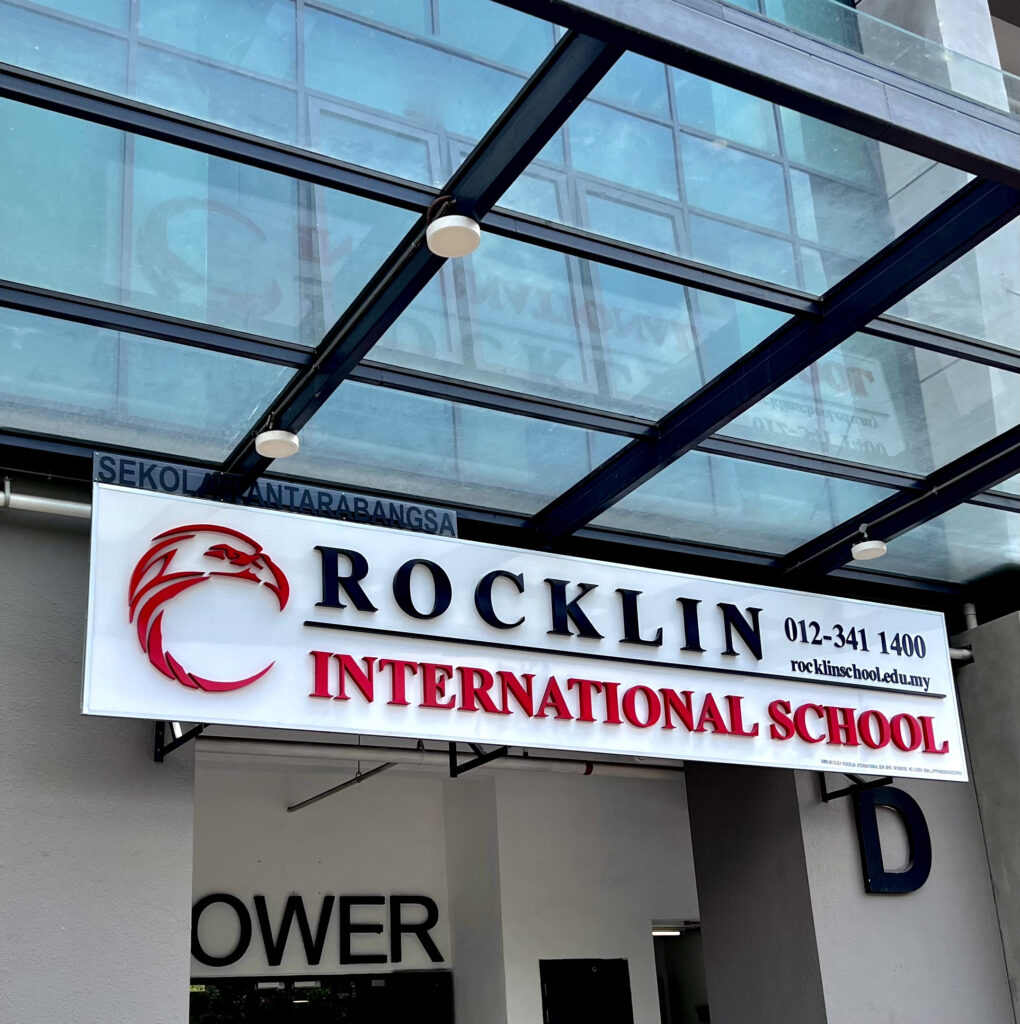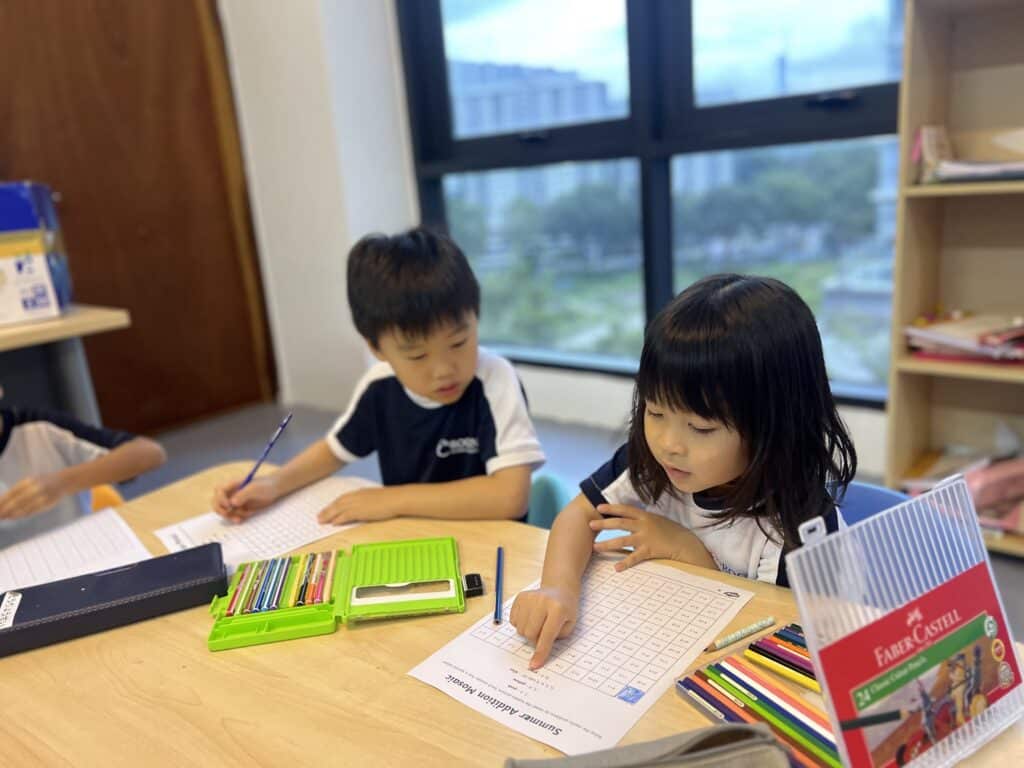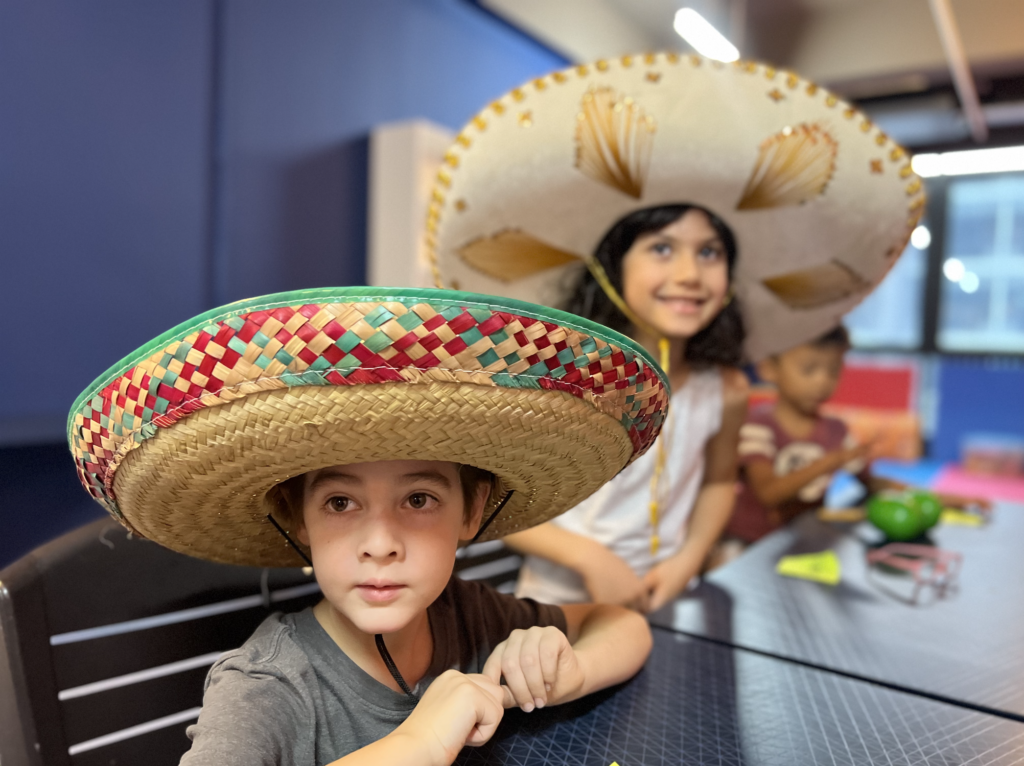Life in Primary
Rocklin’s Primary School delivers an inspiring American-based curriculum that grows with young learners from Kindergarten to Grade 6 (ages 5 to 12). Our dynamic and engaging classroom environment is led by passionate and professional American educators. Our school year runs from end August to early June each year, with a two and a half month summer holiday during the June to August months.
Kindergarten
Students aged 5
Grade 1
Students aged 6-7
Grade 2
Students aged 7-8
Grade 3
Students aged 8-9
Grade 4
Students aged 9-10
Grade 5
Students aged 10-11
School Hours
8 a.m. to 3 p.m. Monday to Friday
From 7.30 a.m. students are met at the entrance by our friendly staff team where they are escorted up to class. Teachers are present to welcome and guide them along the way.
From 7.30 a.m. students are met at the entrance by our friendly staff team where they are escorted up to class. Teachers are present to welcome and guide them along the way.
Class Size
One unique feature of Rocklin is our small class sizes. All core subjects (English Language Arts, Mathematics, Social Studies, and Science) are limited to 15 students to 1 teacher.

Sample Class Schedule for
Kindergarten

Sample Class Schedule for
Grades 2 - 6

A look at our Education Program in Primary
Primary Core Subjects
English language Arts
Lower Primary (Grades K-3)
English Language Arts Grade Kindergarten to Grade 2 complete an early literacy program that integrates:
Phonics Fluency Sight words Reading comprehension Spelling Handwriting
Daily lesson plans and decodable readers work together to reinforce each other. The program is effective and based on research in best practices in literacy instruction. The consistent and structured content encourages and engages students as they meet the learning goals of their grade level.
Daily lesson plans and decodable readers work together to reinforce each other. The program is effective and based on research in best practices in literacy instruction. The consistent and structured content encourages and engages students as they meet the learning goals of their grade level.
ELA Grade 3 curriculum provides a bridge to the next level of ELA instruction. It continues where ELA Grade 2 left off, developing fluent reading and writing skills. It does this by focusing on specific skills like:
Decoding Encoding Grammar Handwriting Writing Process
Similar to Grade Kindergarten to Grade 2, it contains decodable stories on a variety of topics. ELA Grade 3 curriculum also develops listening and learning skills with teachers reading aloud stories that are more advanced than students can read on their own.
Similar to Grade Kindergarten to Grade 2, it contains decodable stories on a variety of topics. ELA Grade 3 curriculum also develops listening and learning skills with teachers reading aloud stories that are more advanced than students can read on their own.


Upper Primary: Grades 4 to 6
By ELA Grade 4 students are able to independently read increasingly complex text, and respond in writing to these texts. Throughout the year, all grades study 6 to 7 content-focused units that include a variety of instructional and assessment methods:
Read-alouds Partner reading Close reading Inferential Evaluative Comprehension questions Grammar Writing Morphology and Spelling
These methods ensure that students are progressing in meeting the schoolwide learner outcomes.
These methods ensure that students are progressing in meeting the schoolwide learner outcomes.
English Language Arts Grade 4 to Grade 6 curriculum continues building upon the foundation laid in the early literacy program. It also focuses on increasing students’ vocabulary and knowledge throughout subject areas like literature, world and American history, and the sciences. The curriculum is research-based and educator-informed and is balanced between fiction and nonfiction readings.
Mathematics
Lower Primary (Grades K-3)
Our Primary Level mathematics curriculum focuses on conceptual understanding with an emphasis on mental math and number sense.
In Grades K to 6 concepts are explained using visual models, followed by exercises using these models. The emphasis throughout all years is students learning the “WHY” behind the mathematical concepts and not just “HOW” to complete the problems, and this emphasis begins as early as Kindergarten.
In Grades K to 6 concepts are explained using visual models, followed by exercises using these models. The emphasis throughout all years is students learning the “WHY” behind the mathematical concepts and not just “HOW” to complete the problems, and this emphasis begins as early as Kindergarten.
Mathematics Grade Kindergarten in agreement with the Common Core State Standards, focuses on representing and using whole numbers and describing shapes and space.
Mathematics Grades 1 to 6 builds upon this number sense to meet and exceed the standards laid out in the Common Core State Standards. The curriculum is mastery-based, to promote students studying the different math topics in depth.
Mathematics Grades 1 to 6 builds upon this number sense to meet and exceed the standards laid out in the Common Core State Standards. The curriculum is mastery-based, to promote students studying the different math topics in depth.


Each grade level is split into eight to ten different units throughout the year with each concentrating on a different theme and its connecting topics. A variety of assessments, including formative and summative assessments, are used to assess students in their development of Mathematical Practice and meeting the Mathematical Standards. After completing our Grade 6 mathematics curriculum, students are prepared to enter Grade 7 Pre-Algebra.
Science
Grades K-5
Our Primary Science curriculum is based upon the underlying research-based principles in the Next Generation Science Standards (NGSS):
Children are born investigators Focusing on core ideas allows for deep meaningful understanding Science and engineering require both knowledge and practice Connecting science to students’ interests Experiences is critical to students’ learning of science.
Science Grades K to 5 curriculum instructional model uses the 5Es:
Engage Explore Explain Elaborate Evaluate
Students are engaged by being introduced to a scientific phenomenon and preparing to investigate a question. Students then explore through a series of hands-on, inquiry-based activities, typically with partners or in small groups. After that, students explain their findings in a variety of ways, while also connecting their new knowledge back to prior knowledge.

Grade 6
Science Grade 6 curriculum stands as a bridge between Primary and Middle School. It is the first year of middle school science. In Grade 6, students cover the following topics:
Light and Matter Thermal Energy Weather, Climate and Water Cycling Plate Tectonics and Rock Cycling Natural Hazards Cells and Systems
Social Studies
Our Primary Social Studies curriculum for Grades Kindergarten to 6 is an inquiry-based and literacy-focused curriculum. It uses the richness of Social Studies content to help students learn to read, write, and think critically while exploring the past and present world around them.
Each lesson is culturally relevant, connecting to the: racial, ethnic, gender, class, language, and immigration experience of our diverse international community at Rocklin International School. The curriculum is organized by grade level with an overall theme for each year.
Each lesson is culturally relevant, connecting to the: racial, ethnic, gender, class, language, and immigration experience of our diverse international community at Rocklin International School. The curriculum is organized by grade level with an overall theme for each year.



Themes include:
Our Families and Neighborhoods (Kindergarten) Our Communities: Local, State, Nation World (Grade 1) Strangers from Different Shores: Migration/Immigration (Grade 2) Exploring Your Home: From Past to Present (Grade 3) Exploring the World (Grade 4) Exploring the United States (Grade 5) Connecting the Ancient World to the Present, (Grade 6)
Each unit in each grade level culminates with project-based learning based on grade level learning goals and standards.